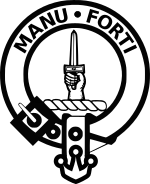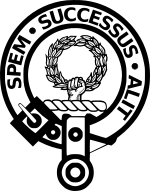Battle of Aldy Charrish facts for kids
Quick facts for kids Battle of Aldy Charrish |
|||||||
|---|---|---|---|---|---|---|---|
| Part of the Scottish clan wars | |||||||
  Clan crest badges of Clan Mackay (left) and Clan Ross (right) |
|||||||
|
|||||||
| Belligerents | |||||||
| Clan Mackay Clan Sutherland (according to one source) |
Clan Ross | ||||||
| Commanders and leaders | |||||||
| John Mackay Robert Sutherland † |
Alexander Ross † | ||||||
| Strength | |||||||
| Unknown | According to Fraser (1674): 400 men | ||||||
| Casualties and losses | |||||||
| According to Fraser (1674): 150 Mackays and 6 Mackay gentlemen killed | According to Gordon (1630): "17 landed gentlemen and a great number of common soldiers" killed According to Fraser (1674): "70 gentlemen and a considerable number of common soldiers killed" |
||||||
The Battle of Aldy Charrish (also known by names like Auldicharish or Alt a'Charrais) was a fight between Scottish clans. It happened on July 11, 1487. In this battle, Clan Mackay and possibly Clan Sutherland defeated Clan Ross and their friends. The fight took place in the Scottish Highlands, probably near Strathoykel.
Contents
Why the Battle Happened
The second half of the 1400s was a time of many raids. The Mackays from Strathnaver often attacked the Rosses from Balnagowan.
Some old writings tell different stories about who started it. The Blackcastle MS says the Rosses attacked Mackay land first. But Sir Robert Gordon, another historian, wrote that the Mackays often bothered the Rosses' lands.
Historian Angus Mackay believes the fight was about land. The Mackays wanted to get back lands in Ross-shire. These lands had belonged to their relatives who were defeated in an earlier battle in 1433. The Rosses also wanted to control some of these lands. So, the two clans were fighting over who owned what.
Earlier, in the 1480s, the Rosses, led by Alexander Ross of Balnagowan, had defeated and killed Angus Roy Mackay at the Battle of Tarbat. Angus Roy Mackay's son, John Mackay, wanted revenge for his father's death. This led him to attack the Rosses in the late 1480s.
Some historians, like Sir Robert Gordon, say that Clan Sutherland helped the Mackays in this battle. However, Angus Mackay, a historian from the 1800s, disagreed. He thought it was unlikely because the Sutherland chief was married to a daughter of the Ross chief.
Old Records of the Battle
We know about this battle from an old book called The Calendar of Fearn. This book belonged to Clan Ross. It says the battle happened on July 11, 1487. It also lists eleven names of people who died at a place called Aldecharwis.
Where and When It Happened
Most sources agree the battle was on July 11, 1487. Some older writings mistakenly said June 1486, but the Calendar of Fearn clearly states 1487.
The exact place of the battle is a bit of a mystery. Most sources say it was in Strathoykel or Strathcarron. It was likely near the Carron in Sutherland, which is south of the Oykel River. The most likely spot is a small stream called Allt a'Charraigh (grid reference NH4897). This stream is between Braelangwell and Rosehall.
Stories About the Battle
Different writers have told the story of the Battle of Aldy Charrish over the centuries. Here's what some of them said:
Sir Robert Gordon's Account (1630)
Sir Robert Gordon wrote a history of the Sutherland family around 1630. He said that John Mackay wanted to get revenge for his father, Angus Mackay, who was killed by the Rosses. John Mackay asked the Earl of Sutherland for help. The Earl sent his uncle, Robert Sutherland, with a group of fighters.
Robert Sutherland and John Mackay attacked Strathoykel, burning and destroying Ross lands. Alexander Ross of Balnagowan, the Ross chief, gathered his forces. They met Robert Sutherland and John Mackay at Aldy Charrish.
Gordon described a long and fierce battle with lots of bloodshed. In the end, the Rosses were defeated and ran away. Alexander Ross of Balnagowan was killed, along with seventeen other important Ross gentlemen and many regular soldiers.
James Fraser of Wardlaw's Account (1674)
James Fraser wrote his Wardlaw Manuscript around 1674. He gave different dates for the events, saying the battle happened in 1479. He also said that 70 important Ross gentlemen were killed, along with Alexander Ross of Balnagowan.
Fraser also mentioned that 150 Mackays were killed, including 6 Mackay gentlemen. He said that Robert Sutherland also died in the battle. John Mackay survived but died soon after from his wounds.
Later Accounts
Other books, like Conflicts of the Clans (1764) and works by Robert Mackay (1829) and Donald MacKinnon (1957), also describe the battle. They often quote or summarize Sir Robert Gordon's account. They generally agree on the main points: the Mackays (and possibly Sutherlands) fought the Rosses, the Rosses were defeated, and Alexander Ross of Balnagowan was killed.
What Happened After
After the battle, the fighting between the Mackays and Rosses continued. In 1490, the King of Scotland, James IV of Scotland, gave some disputed lands to David Ross, a relative of the Ross chief. These lands had been fought over for a long time.
Even though John Rivach Mackay received a pardon from the king in 1494, the feud didn't stop. David Ross of Balnagowan and Iye Roy Mackay were called to meet the Earl of Argyll, a powerful Scottish official. On October 4, 1496, they had to promise to keep the peace and not harm each other's people. If they broke this promise, they would have to pay a large fine.
Despite this agreement, the Rosses later tried to get back things that the Mackays had taken from their lands eight years earlier. The Mackays continued to raid the Rosses' lands well into the 1500s. The feud only really slowed down when the Mackays started having their own problems with their powerful neighbors, Clan Sutherland.
 | Bessie Coleman |
 | Spann Watson |
 | Jill E. Brown |
 | Sherman W. White |

